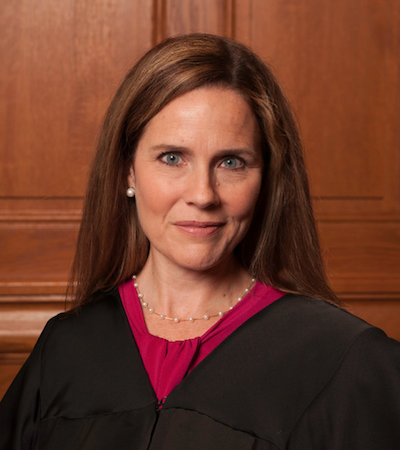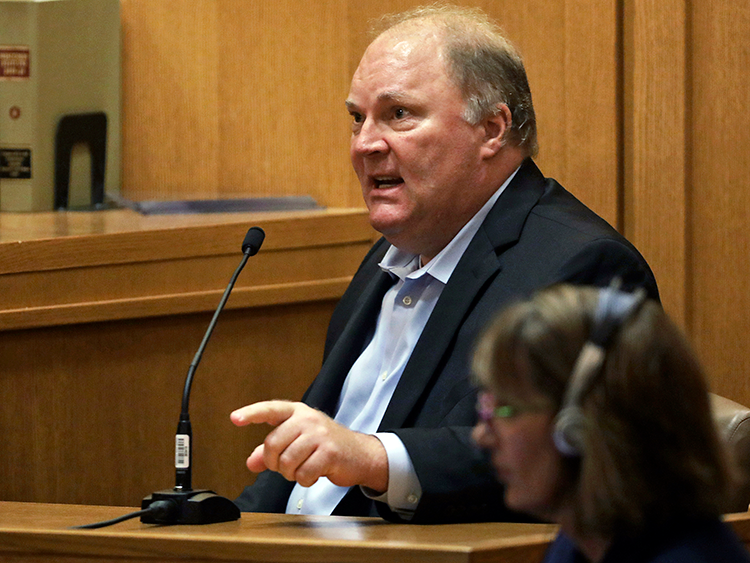Amy Coney Barrett signed 2006 ad calling for end to 'barbaric legacy of Roe v. Wade'

Judge Amy Coney Barrett in 2018. Photo from Wikimedia Commons.
U.S. Supreme Court nominee Judge Amy Coney Barrett is under fire after disclosure of a 2006 ad she signed opposing “abortion on demand” and calling for an end to “the barbaric legacy of Roe v. Wade.”
The ad, signed by more than 1,200 people, was not included in materials provided to the Senate Judiciary Committee considering her U.S. Supreme Court nomination.
Nor was it provided to the committee when Barrett was nominated to the Chicago-based 7th U.S. Circuit Court of Appeals, where she is currently a judge. Publications with coverage include the Guardian (which had the first report), the Associated Press, the New York Times, the Washington Post and the South Bend Tribune.
The ad ran in the South Bend Tribune on the anniversary of the Roe v. Wade decision that established a right to abortion. It was sponsored by St Joseph County Right to Life, which was located in an area known as Michiana that includes part of Michigan and Indiana.
“We, the following citizens of Michiana, oppose abortion on demand and defend the right to life from fertilization to the end of natural life. Please continue to pray to end abortion,” said one page of the ad.
The other page of the ad began with a quote from Justice Byron White calling Roe v. Wade “an exercise of raw judicial power.” This text followed:
“The Supreme Court’s Roe v. Wade decision legalized abortion for any reason. Now, after more than 32 years under Roe more than 47 million unborn children have been aborted. The majority of those abortions were performed for social reasons. Yet poll after poll continues to show that an increasing majority of Americans are opposed to abortion as a method of birth control. And in 2000, the Supreme Court ruled that Roe v. Wade allowed and protected the brutal partial-birth abortion procedure—a practice opposed by over 70% of all Americans. It’s time to put an end to the barbaric legacy of Roe v. Wade and restore laws that protect the lives of unborn children.”
Barrett was a Notre Dame law professor when she signed the ad.
Barrett has participated in two abortion cases on the 7th Circuit. In both cases, Barrett joined dissenters who would have granted rehearings en banc after three-judge panels found fault with restrictive Indiana abortion laws.
White House spokesperson Judd Deere gave a statement defending Barrett’s impartiality to several publications. “As Judge Barrett said on the day she was nominated, ‘A judge must apply the law as written. Judges are not policymakers, and they must be resolute in setting aside any policy views they might hold,’” he said.
The statement also noted that Barrett was on a 7th Circuit panel that denied a stay of execution for Daniel Lewis Lee, a white supremacist who shot and killed a family of three. That decision contradicted Barrett’s personal support of all life from “fertilization to natural death,” the White House statement said.
When she was a University of Notre Dame law student, Barrett co-wrote a 1998 law review article with one of her professors that argued Catholic judges may recuse themselves from death penalty cases because of the church’s opposition to the death penalty.
Barrett distinguished between sentencing a criminal to death, in which faithful Catholic judges should recuse, and ruling on collateral review, where recusal isn’t necessary. She also noted an argument that recusal is required in abortion cases. Here are some relevant passages:
“We believe that Catholic judges (if they are faithful to the teachings of their church), are morally precluded from enforcing the death penalty. This means that they can neither themselves sentence criminals to death nor enforce jury recommendations of death. Whether they may affirm lower court orders of either kind is a question we have the most difficulty in resolving. There are parts of capital cases in which we think orthodox Catholic judges may participate—these include trial on the issue of guilt and collateral review of capital convictions.”
“In modern Catholic teaching, capital punishment is often condemned along with other practices whose point is the taking of life—abortion, euthanasia, nuclear war and murder itself. It is sometimes said that consistency requires no less—that respect for life in all these cases is a seamless garment.”
“But a more precise statement of the church’s teaching requires a few qualifications. The prohibitions against abortion and euthanasia (properly defined) are absolute; those against war and capital punishment are not. There are two evident differences between the cases. First, abortion and euthanasia take away innocent life. This is not always so with war and punishment.”
In footnote 159, the article says: “Michael Paulsen makes an argument much like this in connection with abortion. He concludes that ‘where there is no honest, legitimate alternative for deciding the case but to follow positive law supporting the right to commit an abortion,’ the judge should recuse himself. … The abortion case is a bit easier, we think. Both the state and the unborn child’s mother are (at least typically) acting with gross unfairness to the unborn child, whereas the moral objection to capital punishment is not that it is unfair to the offender.”



